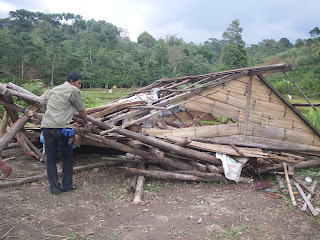
Oyos Saroso HN,
Bangkunat, West Lampung
Marauding wild elephant herds in the rural settlements of West Lampung and Tanggamus regencies over the last several years have made local residents wary, at times fearing for their lives. These "invasions" have also harmed the local economy, as the elephants frequently wreak havoc on their paddy fields and plantations.
According to the Wildlife Conservation Society (WCS) based in Lampung, dozens of hectares of rice, coffee and banana crops have been damaged by intruding elephants in the past year.
Suratno, a villager of Ulu Semong, West Lampung, claimed that he had been almost unable to reap his coffee harvests over the last two years.
"They come suddenly, and in a large herd. We can only move away to avoid being their target," he said.
The elephants who live in Bukit Barisan Selatan National Park (TNBBS) always come in herds at night, when people are about to go to bed. Once they invade, it is a certainty that several rice paddies and plantations will be destroyed. Sometimes, the wild mammals also ravage village homes. More than five people have died in Lampung over the year due to elephants.
The wild herds were generally driven back to the TNBBS by forest rangers and locals by waving torches and beating bamboo drums. Lately, however, the elephants have begun to behave differently, ignoring the flame and loud drumbeats. The group of villagers trying to scare them away are now even attacked by the big mammals.
"Well, once we were sent scurrying. As I was turning them away one night, they attacked. Fortunately, I managed to climb a big tree quickly so I was safe," recalled Andreas Andoyo, 40, an environmental activist in Lampung.
The behavioral change, according to Andreas, is most likely their continuing proximity to human beings as a result of shrinking elephant habitat caused by illegal logging.
"They are now accustomed to flames and drumbeats," he said.
WCS-Lampung records show that elephant intrusions have become intense in the past year.
In Bengkunat district, West Lampung, about 25 wild elephants have entered settlements and ruined farmland over the last nine months. Locals were able to confirm the number because the intruders were still wandering around their farms until 10 in the morning.
The mammals devour whatever they find in the village plantations, damaging young coconut trees to eat their base shoots. Coconut, sugarcane, groundnut and near-harvest rice crops are not spared either.
In Sekincau and Way Tenong districts, West Lampung, seven wild elephants from TNBBS's Sekincau Hill have descended to housing areas in the last few months, crushing coconut trees, tuber plants, vegetables and paddy fields. In Air Abang and Sidodadi hamlets, the herd destroyed three houses.
These raids in Sekincau have been ongoing since September 2005, generally taking place at night and after dawn. As a rule, elephants only leave their habitat in the evening and return by dawn. Yet in the recent attacks, they remained roaming on farmland until mid-morning.
Based on WCS and Lampung Conservation Watch (LCW) studies, their frequent roving and disruption is a result of their damaged and diminished habitat, caused by illegal logging as well as forest squatting.
Forest conversions have made their habitat no longer ideal for living and reproduction. The farms and settlements where elephants often traverse are believed to have once been part of the mammals' original cross-trails or territory.
Dwi Nugroho Adhiasto, coordinator of the Wildlife Crime Unit in Lampung, said the villages now targets of elephant invasions were formerly within the elephants' natural territory. These areas were later turned into settlements and plantations following the high rate of deforestation.
"So the elephants are not to blame, in fact. The regions were theirs to live in," he added.
In Lampung province, Sumatran elephants live in the wild in the TNBBS, which spans 360,000 hectares from Tanggamus to West Lampung regencies and as far as Kaur regency in Bengkulu province. They are also found in Way Kambas National Park in East Lampung, as well as a few other areas.
In both national parks, the elephant population is today estimated at only around 500.
Their habitat remains under the threat of illegal poachers eyeing elephant tusks for trading, although the species does not sport the long tusks common to African elephants.
Syndicates of the illicit trade sell the tusks at very high prices, with an ounce of tusk powder costing millions of rupiah -- and at the cost of the animal, which are killed to extract the tusks.
The Jakarta Post, July 10 2007

0 Response to "Annual invasions wreak havoc on village crops"
Posting Komentar